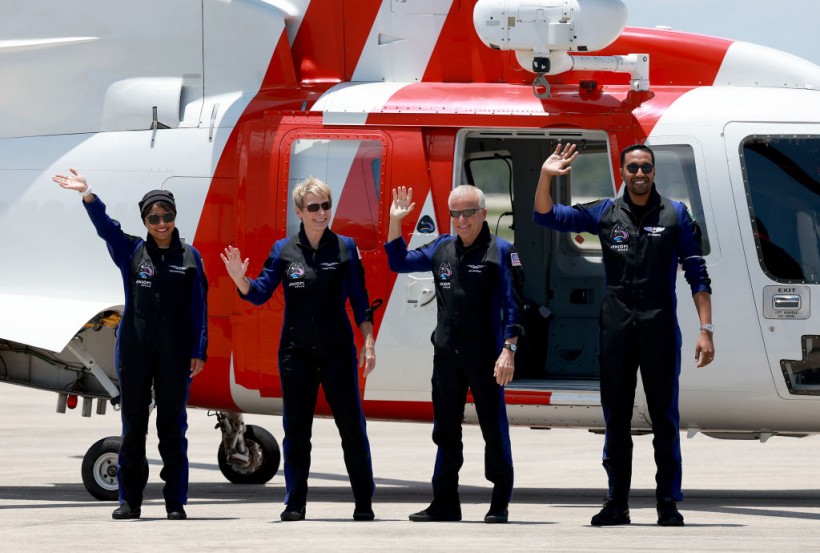On Sunday afternoon, a SpaceX rocket launched from Florida with a renowned ex-NASA astronaut and three individuals who paid for the trip. The crew is beginning a week-long expedition to the International Space Station.
Axiom Space, a Houston-based company, organized this remarkable journey, known as AX-2. As per CNN's report, it is the second entirely private astronaut mission to the space station.

(L-R) Saudi astronaut Rayyanah Barnawi, former NASA astronaut Peggy Whitson, investor and pilot John Shoffner, and Saudi astronaut Ali AlQarni wave before being brought to the SpaceX Falcon 9 rocket with the Crew Dragon spacecraft for launch from pad 39A at the Kennedy Space Center on May 21, 2023 in Cape Canaveral, Florida.
AX-2 Crew Members
On Sunday, May 21, the mission commenced with the launch of a SpaceX Falcon 9 rocket and Dragon capsule from NASA's Kennedy Space Center in Florida. Space.com reported that onboard the spacecraft are Rayyanah Barnawi and Ali AlQarni, who belong to Saudi Arabia's inaugural group of astronauts. Barnawi is notable for being the first Saudi woman to venture into space.
Last week, Barnawi expressed her deep sense of honor and joy as she spoke to reporters, stating, "It brings me great pride and happiness to represent the dreams and aspirations of the people in Saudi Arabia, particularly the women, during this remarkable journey."
Joining them on this journey are the accomplished former NASA astronaut Peggy Whitson, who will assume the role of commander, and John Shoffner, a paying customer selected as Ax-2's pilot.
The four crew members will travel back and forth to the International Space Station using the Dragon capsule named Freedom. The mission's duration is planned for 10 days, with eight of those days spent on the station.
Despite the launch taking place on Sunday afternoon, weather officials closely monitored the presence of thunderstorms. Florida is entering its summer wet season, which adds a level of difficulty in finding optimal conditions for rocket launches.
READ ALSO: Axiom Space VP Says 'Commercial Astronauts' Will Carry Out Experiments Without Annoying ISS Crew
AX-2 Private Astronaut Mission
Due to launch delays caused by a postponed Falcon Heavy launch, Space News reported that the Ax-2 mission had to be shortened by two days to accommodate the crowded schedule of missions heading to the ISS. Axiom Space and NASA reached an agreement to adjust the mission duration from the originally planned 10 days.
During a briefing on May 15, Derek Hassmann, chief of mission integration and operations at Axiom Space, explained that research activities took precedence for the mission, while some lower priority outreach and other activities were dropped. However, the Saudi astronauts still intend to engage in numerous media events during their time on the station, including sessions with students.
Even before the mission was shortened, the crew faced a packed schedule. They were set to conduct over 20 experiments covering various topics, such as life sciences and in-space manufacturing. Axiom also had its technology demonstrations in place to support its plans of developing commercial modules to be added to the ISS as a precursor to a standalone space station.
Drawing from the lessons learned during the Ax-1 mission, where the workload for the four-person crew was overwhelming, the Ax-2 crew adjusted their training accordingly. They allocated more work to certain areas while reducing it in others to ensure improved efficiency and manageability.
The Ax-2 mission represents the tenth crewed flight by SpaceX in a span of fewer than three years, starting with the Demo-2 commercial crew test flight for NASA in May 2020.
Since then, SpaceX has successfully launched six crew rotation missions to the ISS, along with the Ax-1 mission. In 2021, they also launched Inspiration4, a private astronaut mission that spent three days in space without docking with the ISS.
RELATED ARTICLE: Axiom's ISS Mission Includes Investors and Not Scientists, Here's Why
Check out more news and information on Space in Science Times.














